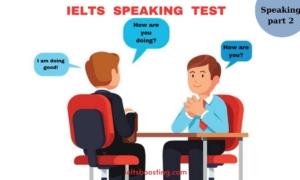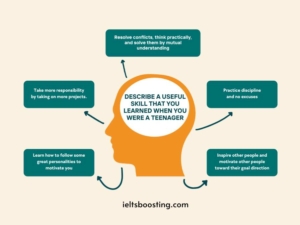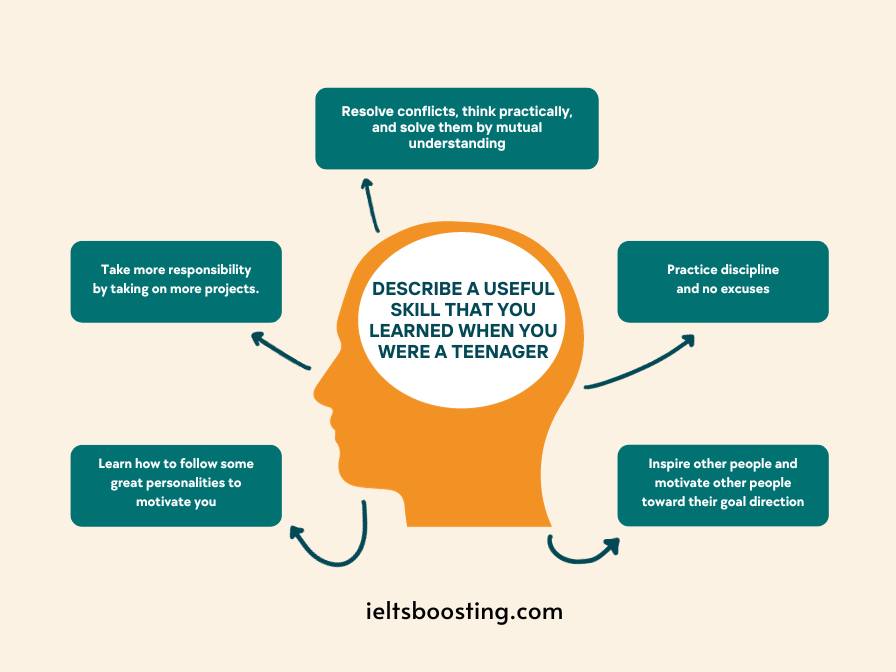Describe a useful skill that you learned when you were a teenager
You should say:
What it is
When you learned it
Who you learned it from
And explain how you feel about this skill

Describe a useful skill that you learned when you were a teenager
Sample answer
One of the most useful skills I acquired as a teenager was cooking. I picked it up when I was around 15 years old. The teacher of this skill was none other than my mother. She is an excellent cook and has always been passionate about cooking. She believed that cooking was an essential skill, especially when I moved to the city for higher education after graduating from high school and had to live alone. So, I was encouraged to master this skill.
She guided me through some basic aspects of cooking like how to choose fresh ingredients, and what food should be combined together to make a delicious meal. In addition, she also showed me how to season dishes with salt, sugar, and ajinomoto.
To cut a long story short, talking about my feelings about this skill, I think that it has had a positive impact on my life. Firstly, I have become more aware of nutrition since I embraced this skill. I understand the importance of a balanced diet and how different ingredients contribute to our health. Secondly, I realized the importance of planning before cooking. It’s not just about the act of cooking, but also about preparing the ingredients, planning the menu, and managing the time. This skill has not only helped me in the kitchen but also in other aspects of life where planning and preparation are key. Now, I sometimes cook for my children and impart them basic cooking skills.
Useful vocab:
| Word | Word Form | Vietnamese Translation | Example Sentence |
|---|---|---|---|
| Acquired | Verb | Đạt được | One of the most useful skills I acquired as a teenager was cooking. |
| Passionate | Adjective | Đam mê | She is an excellent cook and has always been passionate about cooking. |
| Essential | Adjective | Thiết yếu | She believed that cooking was an essential skill. |
| Master | Verb | Thành thạo | So, I was encouraged to master this skill. |
| Guided | Verb | Hướng dẫn | She guided me through some basic aspects of cooking. |
| Delicious | Adjective | Ngon | What food should be combined together to make a delicious meal. |
| Season | Verb | Nêm gia vị | She also showed me how to season dishes with salt, sugar, and ajinomoto. |
| Nutrition | Noun | Dinh dưỡng | I have become more aware of nutrition since I embraced this skill. |
| Balanced diet | Noun | Chế độ ăn cân đối | I understand the importance of a balanced diet. |
| Planning | Noun | Kế hoạch | I realized the importance of planning before cooking. |
| Preparing | Verb | Chuẩn bị | It’s not just about the act of cooking, but also about preparing the ingredients. |
| Managing | Verb | Quản lý | Planning the menu, and managing the time. |
| Impart | Verb | Truyền đạt | Now, I sometimes cook for my children and impart them basic cooking skills. |
| Positive impact | Noun | Ảnh hưởng tích cực | I think that it has had a positive impact on my life. |
| Embraced | Verb | Đón nhận | I have become more aware of nutrition since I embraced this skill. |
Describe a person who enjoys cooking for others

Describe a useful skill that you learned when you were a teenager
Part 3-Describe a useful skill that you learned when you were a teenager
Where do children learn skills in your country?
In my country, children learn skills from various sources, such as their family, school, community, and media. Family is the first and most influential source of skills for children, as they learn how to communicate, behave, and interact with others from their parents and siblings. School is another important source of skills, as children learn academic, social, and practical skills from their teachers and classmates. Community is also a source of skills, as children participate in different activities, clubs, and events that expose them to new experiences and challenges.
Some useful vocabulary for this topic are:
- influence: the power or ability to affect someone’s beliefs or actions
- academic: relating to education and scholarship
- practical: relating to action rather than theory or ideas
- participate: to take part in or become involved in an activity
- expose: to make something visible or known
- platform: a means of communication or expression, such as a website, newspaper, or TV channel
What are the differences between learning skills on your own and from others?
There are some differences between learning skills on your own and from others. Learning skills on your own requires more self-motivation, discipline, and curiosity, as you have to set your own goals, plan your own strategies, and seek your own feedback. Learning skills from others can be more interactive, collaborative, and social, as you can benefit from the guidance, support, and feedback of other people, such as teachers, peers, or mentors. Both ways of learning skills have their advantages and disadvantages, depending on the type of skill, the learner’s preference, and the available resources.
Some useful vocabulary for this topic are:
- self-motivation: the ability to do something without being influenced or encouraged by someone else
- discipline: the ability to control one’s behavior and actions, especially in order to improve oneself or follow a rule
- curiosity: the desire to learn or know more about something or someone
- interactive: involving communication or cooperation between people or things
- collaborative: involving two or more people working together to achieve a common goal
- feedback: information or opinions that are given to someone as a way of helping them to improve their performance or skills
What important skills should a child learn?
There are some differences between learning skills on your own and from others. Learning skills on your own requires more self-motivation, discipline, and curiosity, as you have to set your own goals, plan your own strategies, and seek your own feedback. Learning skills from others can be more interactive, collaborative, and social, as you can benefit from the guidance, support, and feedback of other people, such as teachers, peers, or mentors. Both ways of learning skills have their advantages and disadvantages, depending on the type of skill, the learner’s preference, and the available resources.
Some useful vocabulary for this topic are:
- self-motivation: the ability to do something without being influenced or encouraged by someone else
- discipline: the ability to control one’s behavior and actions, especially in order to improve oneself or follow a rule
- curiosity: the desire to learn or know more about something or someone
- interactive: involving communication or cooperation between people or things
- collaborative: involving two or more people working together to achieve a common goal
- social: relating to or involving activities in which people spend time talking to each other or doing enjoyable things with each other
- guidance: help or advice that is given to someone, especially by someone who has more experience or knowledge
- support: the act of helping someone or something, especially by giving money, encouragement, or other resources
- feedback: information or opinions that are given to someone as a way of helping them to improve their performance or skills
What skills do you think teenagers should have?
There are many important skills that a child should learn, but I think some of the most essential ones are communication, creativity, and critical thinking. Communication skills help children to express themselves clearly, listen actively, and cooperate with others. Creativity skills help children to explore their imagination, generate new ideas, and solve problems. Critical thinking skills help children to analyze information, evaluate arguments, and make decisions.
Some useful vocabulary for this topic are:
- communication: the exchange of information or ideas between people or groups
- creativity: the ability to produce original or unusual things or ideas
- critical thinking: the process of thinking carefully and logically about something in order to form a judgment or opinion
- cooperate: to work together with someone or something for a common purpose or benefit
- explore: to examine or investigate something in order to learn more about it
- generate: to produce or create something
- analyze: to examine something in detail in order to understand it or explain it
- evaluate: to judge or assess the quality, value, or importance of something
Who should teach teenagers skills?
I think there are different people who can teach teenagers skills, depending on the type and level of the skill. For example, parents can teach their children basic life skills, such as cooking, cleaning, and managing money. Teachers can teach their students academic skills, such as reading, writing, and math. Coaches can teach their athletes physical skills, such as running, swimming, and playing sports. Mentors can teach their professional skills, such as communication, leadership, and teamwork.
Some useful vocabulary for this topic are:
- academic: relating to education and scholarship
- physical: relating to the body or bodily activities
- professional: relating to a job that requires special education or training
- mentor: a person who gives another person help and advice over a period of time, especially help and advice related to their job
What are the differences between children learning skills and adults learning skills?
I think there are some major differences between children learning skills and adults learning skills. Children tend to learn skills more easily and quickly than adults, as they have more flexible and adaptable brains. Adults, on the other hand, may have more difficulties and barriers in learning new skills, such as lack of time, motivation, or confidence. However, adults may also have some advantages over children, such as more prior knowledge, experience, and self-awareness.
Some useful vocabulary for this topic are:
- flexible: able to change or adapt according to different situations or needs
- adaptable: able to adjust to new conditions or environments
- barrier: something that prevents or blocks progress or achievement
- prior: existing or happening before something else
- self-awareness: the ability to recognize and understand one’s own feelings, thoughts, and actions

